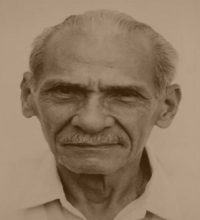My tour of sentry duty ended at five this morning. Ramon Cabrera relieved me. As I was about to sleep, I overheard the PC lieutenant on our left giving orders to break tent and be ready to retreat in 15 minutes. I immediately woke up S/Sgt. Alfred who told me to forget it. Half an hour later, however, Alfred got up and thought it best to notify the CO. He did it just in time to find out that all the other cars had already broken camp and were ready to roll off. It appeared that our section commander forgot to relay the orders to us. As I hurriedly broke camp, I remembered that it was my sister Nena’s birthday. I also recalled having been told that if Limay were taken it would mean the end of the struggle. Once more, I burst into tears when I realized the situation.
At about 6:30 a.m., orders were given to start engines then roll. Soldiers by the thousands were flanking the road. Trucks by the hundreds sped to the rear. Everything was in utter chaos. Halt was given at Km. 148. Here, the bombing was more intensive than ever. About 50 planes playfully glided over us and dropped their death eggs this time with impunity. A bomb dropped close enough to cover us with leaves, branches and dust. The smell of powder was suffocating. It was already one in the afternoon. We had as yet eaten neither breakfast nor lunch.
Realizing that everything was in utter confusion and anything could happen, I once more approached our CO who was always open to suggestions. I suggested that we should get our two days ration from the PC supply truck (we were attached to the PC for supplies) so that in case we got separated from them, we wouldn’t starve. However, the CO who had a high fever and was very worried about the deteriorating development, took it as an insolent remark. He interpreted it as lack of confidence on my part. Indeed, ten minutes later, the supply truck driver saw it fit for his hide to beat it. He fled with the supply truck and all.
At 4:30 p.m., someone on our left flank fired. In seconds, the entire line took up the cue and started rapid fire. I searched hard for a sign of the enemy but couldn’t see anything that could be attributed to their presence. I ran to the CO for direction but even he could not see the enemy. No one in our company fired. We shouted to the PC soldiers to cease firing, as there was no enemy. But the soldiers were too excited to hear, too nervous to stop.
During these moments, I remembered how coolly Papa kept his nerves during his encounters with the Moros. I was wishing I had a cigarette to smoke during the coming fight. As a matter of fact, for weeks, I kept a cigarette for this purpose, but I had smoked it before I remembered what I kept it for.
At about 6:00 p.m., we learned that our left and right flanks had withdrawn hours before without our knowledge. The fourth car was ordered to report the situation immediately to Colonel Garcia, the regimental commander in Lamao. We rolled off as fast as we could, taking cover every time a plane was spotted.
I mounted my gun once more on the third car. As we rolled to retreat, we flashed our lights on and off as instructed. But when we got to Lamao, the motorized artillery unit was no longer there. We halted at Km. 153 and there we waited for further orders. It was there that we felt a strong earthquake that shook the entire island of Luzon. Following orders, we arrived in Cabcaben at four in the morning. Our stopping place was near the Cabcaben wharf, so I figured that we would Dunkirk to Corregidor and there make a last stand. I was disappointed.
